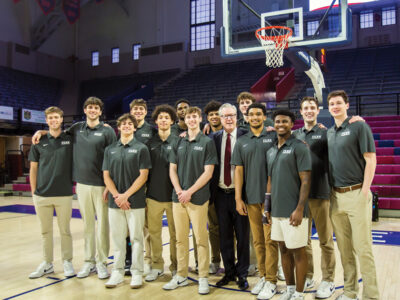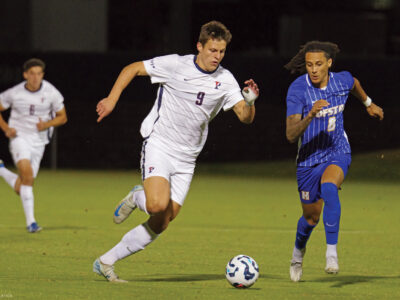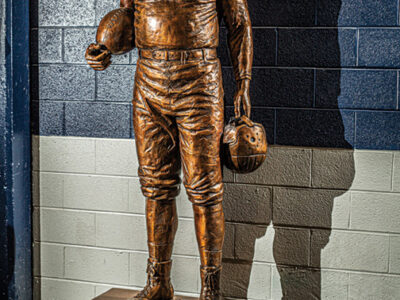By David Porter | Given the way the recently completed football season progressed, trust that Penn coach Al Bagnoli will never, ever send any of his quarterbacks onto the field with the standard show-business saw, “Break a leg.” It would be unwise to tempt fate after a series of injuries left the Quakers down to their fourth-string quarterback by their last game, the customary every-other-year, season-ending freeze fest against Cornell in Antarctica, er, Ithaca.
That Penn was able to roll over the Big Red to complete a 5-2 Ivy League record and its first overall winning season since 2004 was a testament to the players’ resilience and resourcefulness and to Bagnoli’s ability to adjust his game plan according to whoever was taking snaps that week. In the midst of it all, the Quakers regained some of the edge that has been missing for the last three seasons as the balance of power in the league has shifted north to Providence, Cambridge, and New Haven.
“We’d never been down to our third or fourth quarterback, and that speaks volumes about the kids and their preparation,” Bagnoli said by phone recently from a recruiting trip to Florida. “I thought those kids did a fabulous job under dire circumstances. It’s definitely not the easiest scenario for anybody.”
The upside to the spate of injuries was that it enabled Bagnoli to see all the quarterbacks in game situations, something that would have been nearly unthinkable at the start of the season even though there was uncertainty surrounding senior starter Robert Irvin, who was attempting a comeback from shoulder surgery. When the dust finally settled, the Quakers had found themselves a player—sophomore Keiffer Garton—whose debut sent a jolt through the Penn football universe and sent scribes searching through the record books for comparisons.
“The players were calling him Tebow,” Bagnoli said, a reference to Florida quarterback Tim Tebow, the 2007 Heisman trophy winner and a player for whom new superlatives seem to be minted every other week or so. It’s high praise for an Ivy League quarterback—even with the accompanying nudge and a wink—but if any quarterback in the Ivies has the potential to approximate Tebow’s combination of size, elusiveness, and agility, it is Garton.
Garton ran for one touchdown and threw for another in a 14-9 win at Princeton on November 7 that kept Penn in the Ivy race; then, a week later, he completed 21 of 37 passes for 193 yards and ran for 174 yards and two touchdowns in a 24-21 loss to Harvard at Franklin Field. The 367 yards of total offense was the 11th-best single-game performance in Penn history. That game featured a highlight-reel-worthy juking, weaving 63-yard fourth quarter touchdown run by Garton, but what fans will remember most about his performance is the throw that got away. With Penn trailing by three in the final seconds and well within field goal range, Garton’s pass into the end zone was intercepted, dashing the Quakers’ chance to tie the game and force overtime.
“I told him, ‘Throw the ball through the end zone and let’s line up for a field goal,” Bagnoli said. “Unfortunately, it was his second and third read, because the first receiver was covered. We were trying to purposely throw it to the sidelines so they couldn’t get to it. But he went off that read, saw a guy open in the middle and got pressure, got hurried and the ball sailed on him.
Still, Bagnoli added, “The way he ran the offense and the way he did some of the little things showed he was paying attention before he had to actually play.
“He’s really a competitive kid, and one of his attributes is his leadership and self-confidence. I remember sitting in the meeting room before the Princeton game thinking, ‘We’re down to our third kid who’s played 40 snaps since he’s been here, and we’re confident going in to play Princeton.’”
On paper, the Quakers look ready to reload and mount a serious challenge for the Ivy title in 2009.
“We’re starting to get a little bit of the swagger back,” Bagnoli said. “Everybody’s invigorated, energized. Hopefully we can capitalize with a great recruiting year.”
An early holiday break couldn’t come soon enough for Glen Miller’s basketball team after a 1-6 start that will test his young group’s ability to find its footing before the Ivy League schedule begins. Miller planned to use the 24-day gap between a 76-65 loss to Navy and the University of Central Florida tournament in Orlando to help them do just that.
“Any time a team is struggling like we are, from a coaching standpoint, from a teaching standpoint, you look forward to an extended period where you have a chance to really work on some things and improve,” Miller said after the Quakers’ loss to Navy at the Palestra, which lately has lost some of the intimidation factor it used to hold for visiting teams.
The Quakers are young, to be sure, but their core players underwent their hazing as freshmen a year ago and should be battle-tested. In this season’s first month they were underwhelming in losses to North Carolina, Penn State, and Villanova that weren’t competitive beyond the early minutes of the second half.
Miller has put a large burden on freshman point guard Zack Rosen, who led the team with 5.5 assists per game (versus 11 total turnovers) in the first seven games. Yet Rosen struggled with his shot, making just six of 28 3-point attempts. He was impressive against Albany, however, with 12 points, eight assists, six rebounds, and three steals. His development and increasing comfort with running the Quaker offense should benefit precocious sophomore shooting guard Tyler Bernardini, the closest thing Penn has to an instant game-changer.
“They realize it’s a long season and there’s plenty of opportunity to get better and they’ll do that,” Miller said.
The men’s soccer team’s transformation into a perennial Ivy contender continued this season with a second league title under coach Rudy Fuller, who led the team to its first crown in more than 20 years in 2002.
This time it was a pulsating, overtime win over Harvard at Rhodes Field that lifted the Quakers into a first-place tie on the last day of the regular season. Since Penn had defeated Dartmouth in their one meeting, the Quakers earned the champion’s designation.
“We really felt going into the season that we had a team that was capable of winning the Ivy League this year,” Fuller said. “We had a lot of confidence, but obviously you need a little good fortune, and things started to go our way.”
The team’s only stumble came in the middle of a span of five games in 14 days when it lost to Lehigh and Columbia. Five wins followed, climaxed by sophomore Loukas Tasigianis’ overtime goal against the Crimson. George Mason knocked the Quakers out of the NCAA tournament in the first round with a 1-0 victory.
“The first few years, we got a lot of support from the administration and alumni who were willing to get us what we needed to be successful,” said Fuller, who took over at Penn in 1998. “That culminated in the Ivy League championship in 2002, which was great. It established us as one of the better programs in the league. Now, we come into every season with the goal of winning the league.”
David Porter C’82 writes for the Associated Press.




